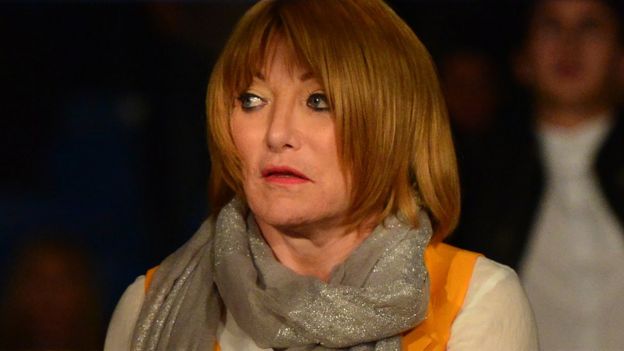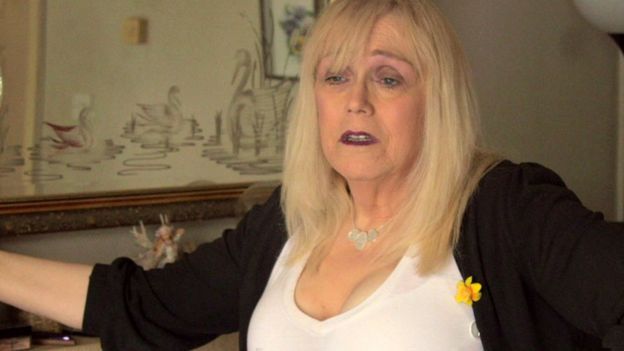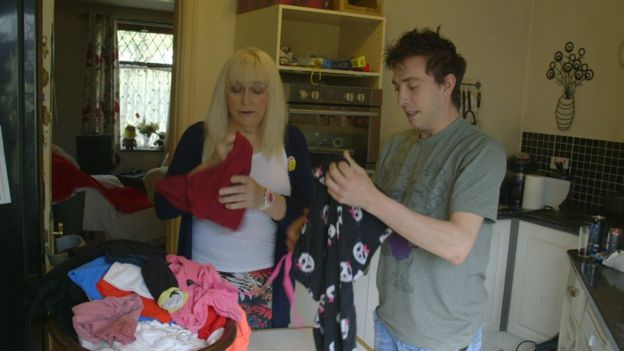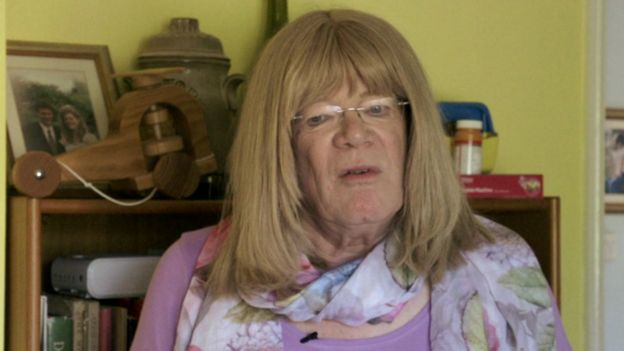Notifications
This is an article from yesterday's BBC Magazine (11 October 2015) about being transgender and over 60. As many of you know I am a long way past my first flushed of girlhood - these days I am nearer to 70 than 60; though inside I still feel about 25.
Being trans is never easy and my generation had to fight a lot of stigma and hostility; and like many transgender people I denied who I really was and am. Now I am comfortable with myself and have made choices which suit me - and I will remain in my half way house where I can be Pauline most of the time and a guy some of the time; as the article below points out for those who transition at 60 plus 50% lose all contact with their family. My compromise suits me but it will not suit those transwomen who want to transition have the surgery and live full time; and I fully respect their choices. There is no one coat tailored for all of us - we all have individual needs and wants and make or don't make our own compromises as we go through life.
Hopefully this article with its positive and negative stories will help those of you on the site who are 55 plusers; and please don't forget that Age UK has useful booklets and help lines for those transpeople who are over 60, and the rest of the 60 plus LGBT community. We truly have come a long way in the past 15 years, never mind since I was a teenager in the 1960s!!
http://www.ageuk.org.uk/health-wellbeing/relationships-and-family/lgbt-information-and-advice/lesbian-gay-bisexual-or-transgender-in-later-life/
Here also is the link to the full BBC article, which has a few more photos in than I could show here - for some reason a couple would not upload. http://www.bbc.co.uk/news/magazine-34454576
I do hope it is useful, any comments and feedback will be very much appreciated.
hugs
Pauline xxxxx

Transgender people and the issues that affect them have never been more visible. But life can be difficult for over-60s who transition gender, writes Cat McShane for the BBC.
Teraina Hird was 67 when she transitioned. She did so privately in Thailand after being told she'd need to wait 18 months just for her first NHS appointment. It was a daunting process. "If you're 25, you've got your whole life in front of you, but at 67 do you want to spend three years in transition?" she says. But Teraina, now 72, was sure of her decision and went ahead: "I felt I couldn't live with my body not matching my brain gender."
Referrals to the UK's seven gender identity clinics is growing by 20% each year, and the NHS is struggling to keep up with demand.

Image caption - Boxing promoter Kellie Maloney transitioned in her 60s
Older people like Teraina are often in a hurry to transition after a lifetime of hiding their true gender identity. Famously, Caitlyn Jenner appeared on the cover of Vanity Fair after transitioning at 65. In the UK, former boxing promoter Kellie Maloney recently announced that her gender reassignment was complete at the age of 62.
Cat McShane's report on gender transition and the over-60s was broadcast on Newsnight
Watch the Newsnight report on BBC iPlayer
But age-related health conditions can also delay the process. On the eve of 62-year-old Dawn's final surgery to transition to female last year, a heart condition was discovered and her operation was pushed back. "The moment I was sent home before the operation was one of the worst days of my life," she says. "For the first time in a long time I wanted to take my own life."
Older patients are more likely to have picked up conditions along the way, says Dawn's surgeon James Bellringer, who has performed more than 1,000 male-to-female gender reassignment operations.
 Image caption - Dawn's transition has been slowed down by underlying health problems
Image caption - Dawn's transition has been slowed down by underlying health problems
"You're more likely to find someone with diabetes or a significant heart problem or a significant chest problem than if you are operating on someone in their 20s," Bellringer says.
There are emotional dangers, too.
Many older transgender people tried to cover up their feelings at a younger age by having marriages and children, and run a high risk of being cut off by family when they finally come out in their 60s or 70s. Nearly half of transgender people with children have no contact with them.
Dawn's son, Lee, 32, is today supportive of his dad's transition from Dave. But when he was first told four years ago, Lee was deeply shocked. "I didn't know what transgender was," he says. "I never felt comfortable talking to any of my friends about what was happening with my dad. I felt like a freak."
 Image caption - Dawn with her son Lee: Getting used to her decision was a difficult process for him
Image caption - Dawn with her son Lee: Getting used to her decision was a difficult process for him
Dawn recalls more positive experiences with her daughter, who oversaw Dawn's first forays into the world of ladies' fashion and make-up. "It was a complete role reversal. I realised I was being told by my daughter, like an adolescent, to get changed into something more suited to my age," Dawn says.
For partners too, transitioning places a huge strain on the relationship. Many marriages fail. Jane and Barbara's 28-year marriage survived. Barbara first discovered her husband John was cross-dressing 20 years ago, finding unknown women's clothes in their wardrobe. She was convinced John was having an affair.
 Image caption - Jane's 28-year marriage survived the transition from male to female
Image caption - Jane's 28-year marriage survived the transition from male to female
Relieved at the truth, they agreed John could dress as a woman in private. "It may seem strange but it brought us closer together, it was our secret," Barbara said. However, John's permanent transition to Jane four years ago placed a strain on the relationship. Barbara - a founding member of Beaumont Partners, a support group for the spouses and partners and an offshoot of transgender group The Beaumont Society - was forced to question her own identity.
"It was very confusing, one thinks one isn't feminine enough or attractive enough," Barbara says. But after she took time to explore her feelings she "realised it was nothing to do with me, it was Jane who needed to be her real self".
Most NHS Trusts require people to live in their new gender for at least two years before being referred for surgery. That period can be difficult, especially if done while working.
Teraina and her partner Anna May Booth, who's 68, both suffered workplace discrimination, but at an age when it was too late to start their careers anew.
Anna says she was bullied by her line manager and lost half her pension because she retired 10 years early.
Teraina was forced to sell her successful engine business. Customers dropped off as she wore more female attire, and she wrote to the local paper to explain the situation, hoping they'd return. Unfortunately, a national newspaper picked the story up and ran it under the headline
"Mechanic loses nuts and customers bolt," after which the business quickly floundered. She sold it for a fraction of what it was worth.
However, the UK 2010 Equality Act was pivotal for some older transgender people, as it offered a greater range of protections for people at work.
One person who took advantage of this was Jane, who's 66 - once a headteacher called John who had feared being found out by neighbours and colleagues across a lifetime of cross-dressing. Jane recalls reading the document and being astonished - "the law protects me" - and began her transition.
Despite the medical challenges, James Bellringer (NHS surgeon for transiitioning transpeople) believes age should not be a barrier.
"In terms of cost effectiveness this is possibly the best operation the NHS does," he said. "Even in a 70-year-old, you've got 15 years of significantly improved quality of life."
And regardless of the challenges, there is an enormous amount of positivity from people transitioning at a later stage of life, who are happy to be living out their final years in their true gender identities.
"I really thought at times I was too old to transition, but the older I got the more determined I became," said Anna. "I'm so glad I did it."
October 12, 2015- -
-
2 like this
- -
-
Report
October 13, 2015- -
-
2 like this
- -
-
Report